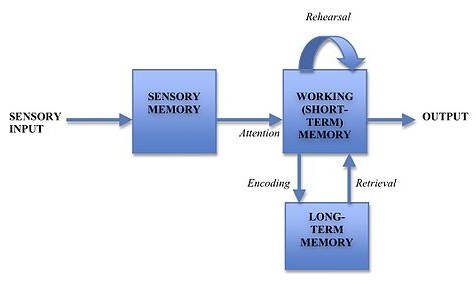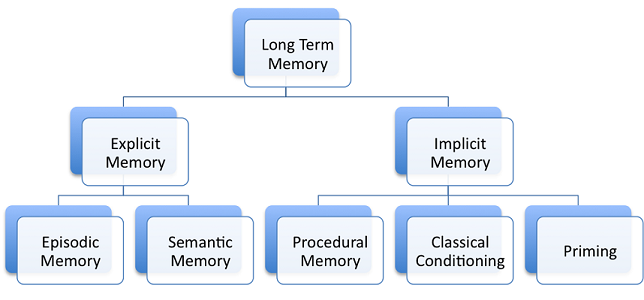 A commonly accepted model of information processing and memory formation and retrieval within the field of psychology is the Modal Model of the Mind¹ (see diagram on right).
A commonly accepted model of information processing and memory formation and retrieval within the field of psychology is the Modal Model of the Mind¹ (see diagram on right).
Based on this, there are three basic types of memory:
1) Sensory memory holds information from the world in its original form for an instant. There are three types of sensory memory:
- Echoic memory: Auditory memory that lasts a few seconds
- Iconic memory: Visual memory that lasts about ¼ of a second
- Haptic memory: Represents sensory memory for the tactile sense of touch
2) Short term/working memory holds information long enough to accomplish the intended purpose for the information.
3) Long term memoryhas two broad categories:
- Explicit long term memories are those that you can fully describe verbally and of which a person is consciously aware. There are two types of explicit memories:
- Episodic memory serves a record of our life’s experience.
- Semantic memory contains data, facts and other information.
- Ex. Remembering that your father’s birthday is May 25th is an example of semantic memory but having a rich memory of going to see
 him on his birthday is episodic.
him on his birthday is episodic.
- Implicit long term memories cannot be fully described verbally and a person may be completely or partially unaware. There are three types of implicit memory
- Priming
- Procedural memory
- Classical conditioning
There are three main steps in the formation, consolidation and retrieval of memory:
- Encoding is the process by which perceptions, thoughts and feelings are transformed into memory.
- Storage is the process of maintaining information in memory over time.
- Retrieval is the process by which information that was previously encoded and stored is brought to mind.
The process that controls our awareness of particular categories of events in the environment is called selective attention. As we know from the Modal Model, sensory memory receives more information than it can transfer into our short term memory².
The process of selective attention determines which events we become conscious of. This may be controlled automatically, by instructions or by the demands of a particular task². Attention plays a vital role in memory as it exerts control over the information that reaches short term memory. Selective attention is necessary for something to eventually be consolidated in explicit long-term memory. That being said, not all of the information we do not pay attention to is lost. Our implicit memory does not require conscious attention.
Why do we not simply process all the information that is being gthered by our sensory receptiors? Many neuropsychologists agree that the brain mechanisms responsible for conscious priocessing have a limited capacity. This means that selective attention fulfills the necessary role of gatekeeper, controlling the flow of selective informaton to this system².
References:
2. Carlson, Neil R., William Buskist, and G. Neil. Martin. Psychology: The Science of Behaviour. Harlow: Allyn and Bacon, 2000.
© BrainMass Inc. brainmass.com June 30, 2024, 9:25 am ad1c9bdddf